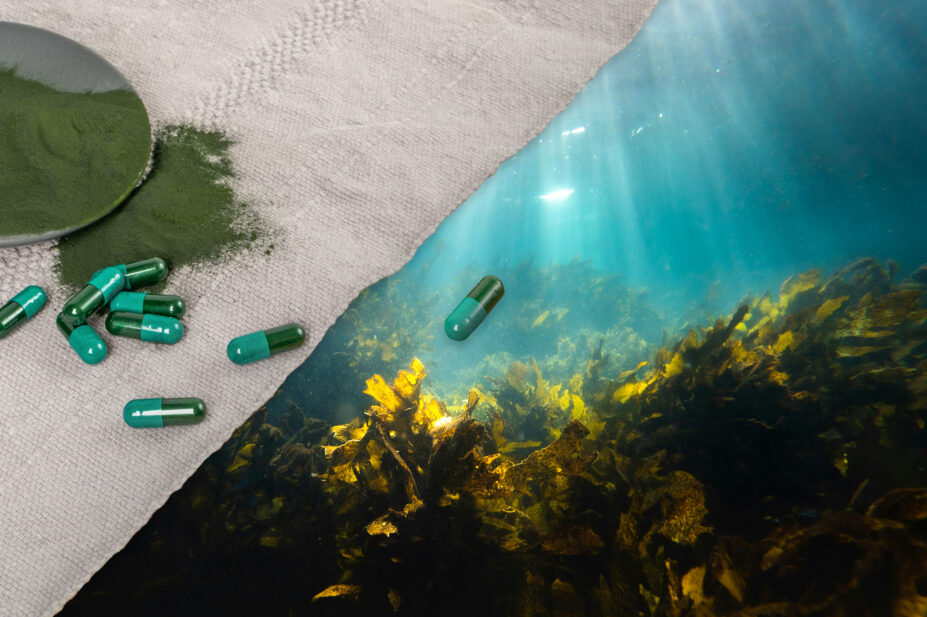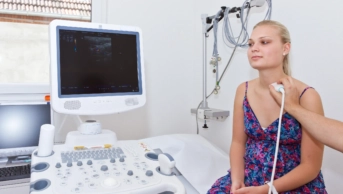
Shutterstock.com/Silas Baisch (Unsplash.com)
After reading this article, you should be able to:
- Briefly describe hypothyroidism and its management;
- Appreciate the importance of conducting a comprehensive medication history during a medication review;
- Understand the implication(s) of iodine-containing products, in particular sea kelp, on the thyroid function and provide advice accordingly.
Background
Hypothyroidism is a common condition caused by an underactive thyroid, resulting in deficiency of the thyroid hormones thyroxine (T4) and tri-iodothyronine (T3). This results in reduced metabolism rate, affecting multiple functions in the body. Symptoms of hypothyroidism usually develop gradually over time and can seem very general[1]. They include:
- Fatigue;
- Constipation;
- Weight gain;
- Depression and reduced libido;
- Numbness and tingling sensation in hands;
- Inability to tolerate cold temperatures;
- Dry skin and hair.
Causes of hypothyroidism can be divided into primary or secondary causes[1]. Primary causes of hypothyroidism are most common and include conditions that directly impact the thyroid gland and result in reduced production of thyroid hormones. Secondary causes are less common and owe to failure in the pituitary gland resulting from another condition, such as a pituitary tumour.
The most common primary cause of hypothyroidism is Hashimoto’s disease, an autoimmune condition, in which the body’s own immune system attacks the thyroid gland, resulting in damage and an impaired capacity to make and release enough thyroid hormones[1]. Other primary causes of hypothyroidism include treatment of hyperthyroidism, iodine deficiency, thyroiditis, and certain medicines that can have an impact on thyroid function, such as lithium and amiodarone[2].
Spontaneous primary hypothyroidism is rare (<2%) in countries where dietary iodine is adequate, such as the UK[3]. Female sex, white ethnicity and obesity are all factors that are associated with increased risk of hypothyroidism[3]. Secondary hypothyroidism is rare and accounts for between 1 per 20,000 and 1 per 80,000 people[4].
As previously discussed, hypothyroidism is a result of thyroid hormone deficiency. Unless there is a secondary cause (e.g. tumour) that needs surgical intervention, this hormone deficiency is usually treated with a medication. In the UK, levothyroxine is the most commonly used medication to correct this deficiency[1]. Treatment is usually lifelong to allow the body to normalise the amount of thyroid hormone continuously. The dose can vary over time and is usually monitored and adjusted according to the thyroid function tests (thyroid-stimulating hormone [TSH] and thyroxine [T4] levels)[1].
Furthermore, iodine-containing herbal supplements available over the counter in herbal shops will impact thyroid function. Examples of these nutraceuticals include sea kelp, carnitine, inositol, melatonin and resveratrol[5]. Patients with thyroid dysfunction, whether hyperthyroidism or hypothyroidism, need to be made aware of the significant impact iodine-containing products can have on their thyroid profile.
Supplementation with sea kelp
Sea kelp is the name given to the collection of brown seaweed species Laminariales[6]. Owing to their iodine content, kelp formulations are promoted as a way to manage thyroid deficiency and promote weight loss[7]. Herbal supplements are often considered safe by the public as they are thought to be ‘natural’, but they can interact with other medicines[8].
According to the British Dietetic Association and the European Food Safety Authority (EFSA), the recommended daily intake of iodine is 150 micrograms in adults (increasing to 200 micrograms in pregnant or breastfeeding adults)[9]. Iodine is present in a range of foods and is particularly rich in dairy products, milk and fish. The concentration of iodine can vary within different seaweed products and can occasionally lead to excessive iodine intake. The average Laminaria-based supplement contains up to 1,000 micrograms of iodine[10]. Ingestion of iodine at daily levels exceeding 150 micrograms has the potential to cause thyroid disorders[7].
Case presentation
A female aged 50 years presents for a structured medication review (SMR) with the clinical pharmacist. She is taking a total of 19 medicines for multiple comorbidities: hypothyroidism, fibromyalgia, post-traumatic stress disorder (PTSD) and urinary incontinence. She has no significant medical family history but reports the loss of her sister and nephew in the Grenfell Tower fire in 2017, which has significantly affected her mental health.
On further questioning, the patient complains of a general history of fatigue, weight gain, constipation, dry skin, muscle aches and low mood. The patient has been making a concerted effort to lose weight but is, in fact, gaining weight.
Three months before the review, the patient visited Egypt and sought medical guidance for management of weight gain and low mood. She was advised by a medical practitioner in Egypt to start on sea kelp supplements. At this point, she started on sea kelp tablets and has been taking three tablets daily for the past three months. She has remained compliant with the levothyroxine dose previously prescribed for her hypothyroidism. Each sea kelp tablet contains 150 micrograms of iodine; therefore, 450 micrograms of iodine are being ingested daily by the patient.
The patient’s symptoms are consistent with hypothyroidism but also overlap with her history of PTSD and fibromyalgia. During the appointment, her clinical observations are unremarkable, with normal oxygen saturation, pulse rate and blood pressure within normal limits and afebrile. A chest examination completed by the GP was clear and non-remarkable.
The pharmacist reviewed the patient’s most recent blood test results with the GP. Despite her adherence with levothyroxine, the blood tests indicated an underactive thyroid resulting in uncontrolled hypothyroidism (see Table). In October 2021, with the same dose of levothyroxine, her TSH was normal (1.4mIU/L).
Physical and laboratory examinations
On review, the patient is conscious, presenting with excessive fatigue, weight gain and constipation. She said she experiences palpitations, but her pulse rate is found to be regular at 80bpm. Her other vital signs are as follows:
- Temperature — 37.1°C;
- Blood pressure — 109/75mmHg;
- Respiratory rate — 20 breaths/min;
- Oxygen saturation — 100% on Sp02.
Routine blood tests (FBC, HbA1c, renal, liver, lipid and thyroid profile) conducted eight days prior to the review were all unremarkable, except for the following:
- TSH — 55.79mIU/L (above normal range);
- Serum-free T4 — 8.8pmol/L (below normal range).
No imaging examinations were necessary.
Diagnosis
Uncontrolled hypothyroidism aggravated by ingestion of sea kelp, a herbal supplement high in iodine content.
Discussion
It is clear that the daily iodine intake of the case study patient exceeded the daily recommended intake and has adversely affected her thyroid function.
Although the symptoms experienced by the patient were very general and could have been exacerbated by her other conditions (fibromyalgia and PTSD), the pharmacist, after consultation with the GP, advised the patient that the sea kelp supplement should be discontinued.
During the SMR, the pharmacist explained to the patient that weight loss would be a struggle with uncontrolled hypothyroidism. She was advised to continue with the same dosage of levothyroxine and to have a repeat thyroid profile in 8–12 weeks (although it had to take place in 16 weeks because the patient had travel plans).
At 16 weeks, the patient’s blood test results reflected the significant impact sea kelp discontinuation had on her TSH. Her TSH was almost reversed eight-fold and approaching normal levels. The patient reported that her dry skin had improved vastly, along with her ability to exercise as she was feeling less fatigued. She had lost some weight but was not happy with her progress. Unfortunately, her history of PTSD and fibromyalgia along with her commitments as a full-time carer to her autistic son hindered her ability to include more exercise in her lifestyle.
Conclusion
Although sea kelp supplements are widely available, the adverse effects on thyroid function are not clearly publicised on the packaging. It is a common patient misconception that herbal products are safe because they are ‘natural’ and lack any side effects; therefore, it is vital to ask patients about their consumption of prescribed medications, over-the-counter products and herbal remedies.
In this case report, the consumption of sea kelp and consequent excessive daily intake of iodine proved to negatively impact the patient’s thyroid function, resulting in overt hypothyroidism.
- 1Hypothyroidism. National Institute for Health and Care Excellence. 2021. https://cks.nice.org.uk/topics/hypothyroidism (accessed February 2024)
- 2Hypothyroidism: symptoms, causes, treatment and medication. Cleveland Clinic. 2020. https://my.clevelandclinic.org/health/diseases/12120-hypothyroidism#management-and-treatment (accessed February 2024)
- 3Vanderpump MPJ, Tunbridge WMG. Epidemiology and Prevention of Clinical and Subclinical Hypothyroidism. Thyroid. 2002;12:839–47. https://doi.org/10.1089/105072502761016458
- 4Klose M, Marina D, Hartoft-Nielsen M-L, et al. Central Hypothyroidism and Its Replacement Have a Significant Influence on Cardiovascular Risk Factors in Adult Hypopituitary Patients. The Journal of Clinical Endocrinology & Metabolism. 2013;98:3802–10. https://doi.org/10.1210/jc.2013-1610
- 5Benvenga S, Feldt-Rasmussen U, Bonofiglio D, et al. Nutraceutical Supplements in the Thyroid Setting: Health Benefits beyond Basic Nutrition. Nutrients. 2019;11:2214. https://doi.org/10.3390/nu11092214
- 6Cincotta J. 6 Benefits of Sea Kelp: Dosage & Safety. Botanical Institute. 2022. https://botanicalinstitute.org/kelp/ (accessed February 2024)
- 7Using kelp in patients on levothyroxine or with thyroid disorders. Specialist Pharmacy Service. 2021. https://www.sps.nhs.uk/articles/using-kelp-in-patients-on-levothyroxine-or-with-thyroid-disorders/ (accessed February 2024)
- 8Natural Doesn’t Necessarily Mean Safer, or Better. National Center for Complementary and Integrative Health. National Center for Complementary and Integrative Health. 2023. https://www.nccih.nih.gov/health/know-science/natural-doesnt-mean-better (accessed February 2024)
- 9Iodine Food fact Sheet. British Dietetic Association. 2022. https://www.bda.uk.com/resource/iodine.html (accessed February 2024)
- 10Laminaria: Overview, Uses, Side Effects, and More. WebMD. 2024. https://www.webmd.com/vitamins/ai/ingredientmono-542/laminaria (accessed February 2024)


